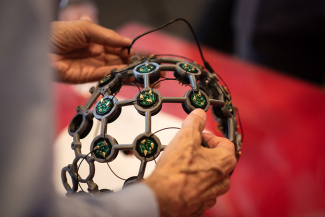
Accepting applications from local students for the REM on February 28, 2025.
What
In addition to the 6 weeks of in-person research, participants will receive professional development training, extended mentoring throughout the academic year, conference participation (travel costs covered), and potentially be included in published literature from the project they work on. For full participation, students will be compensated $3,000.
Who
Those going into 9th – 12th grade who are interested in Engineering (Biomedical, Computer, Electrical, or Mechanical), Computer Science or Math.
Students must have a min GPA of 3.0 (waived under special circumstances), a recommendation letter, and a strong interest in STEM research!
Where
6 weeks on-campus at University of Houston’s Main Campus.
When
- June 16, 2025 – July 25, 2025: In-person research participation (on UH main campus)
- August 1, 2025: IUCRC BRAIN Symposium (on UH main Campus)
- August 2025 – March 2026: Monthly meetings for continued participation (virtual)
- March 2026: In-person IUCRC BRAIN Emergent Researchers Symposium, 9am to noon.
Topics include
Neurotechnology, Brain Computer Interface, Neuromodulation, Exoskeletons, Robotics, Artificial Intelligence, Neuroscience, Neurotherapy, Art Therapy, and Team Science.
- Project 1: Biometrics of Mobility
(Contreras-Vidal, BMI Lab) - Project 2: Effects of Transcranial Magnetic Stimulation on the Brain and Balance in the Elderly
(Parikh, CNBR Lab) - Project 3: Capacitive Power for Getting Magnetic Milli-Robots out of Tight Places
(Aaron Becker, Multi-Robot Systems Lab) - Project 4: For Combat math anxiety with humorous visual exams
(Ioannis Pavlidis, Affective & Data Computing Lab) - Project 5: Segmentation and Classification of Cell Nuclei in Microscopy Images
(David Mayerich, Stim Lab)
Join us and take the first step towards a rewarding career in STEM research!
Join Us Now
Application Window: 02/28/2025 – 04/11/2025; 11:59 PM ET
Eligibility Requirements
- High School student or rising high school student (entering 9th – 12th grade in the Fall 2025 )
- Interest in pursuing hands-on research and a STEM career path.
- Candidates must be United States citizens, nationals, or permanent residents.
- Candidates must commit to participating full-time, in -person, for the 6-weeks program, and the BRAIN Symposium on August 1st (9am – noon) at the University of Houston.